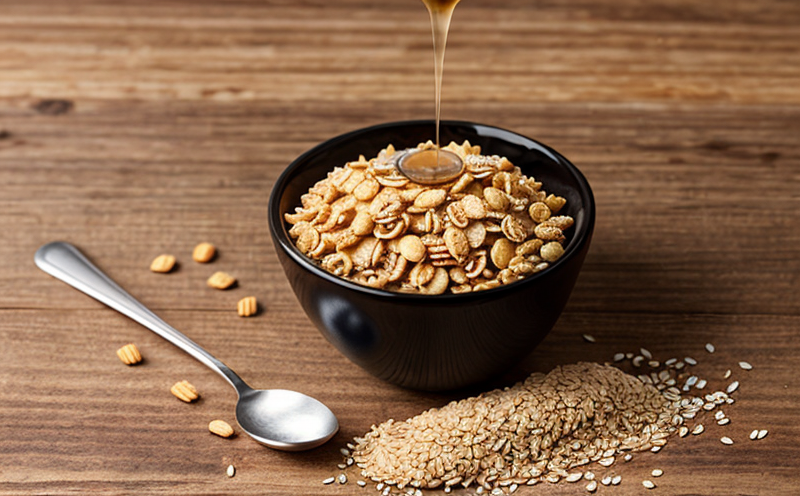ISO 14512 Azaspiracid Detection in Mussels Validation Method Development Test
The ISO 14512 standard provides a validated method for detecting azaspiracids (APDs) in mussels, which are potent marine shellfish toxins. These toxins can cause severe gastroenteritis known as "azaspiracid syndrome" when consumed by humans. This service is crucial for seafood safety and quality assurance, ensuring that consumers do not ingest harmful substances.
Azaspiracids belong to the group of polyether toxins produced by marine phytoplankton and are particularly prevalent in mussels. Given their potential for causing widespread health issues, the development of a reliable testing method is paramount. This service focuses on validating new detection methods against ISO 14512 standards using real-world samples from various regions.
The process involves several critical steps: sample collection, preliminary analysis, and final validation. Samples are collected from different geographical locations to ensure that the test conditions accurately reflect diverse environmental factors. The preliminary analysis uses rapid screening tests to identify potential positives for further confirmation by the ISO 14512 method.
Once a sample is identified as positive through preliminary testing, it undergoes rigorous validation according to ISO standards. This includes multiple rounds of testing using standardized reagents and equipment. The results are compared with those obtained from other validated methods to ensure consistency and reliability. This approach not only validates the new test method but also ensures that it adheres to international safety standards.
The service is designed for quality managers, compliance officers, R&D engineers, and procurement professionals who need reliable data on azaspiracids in mussels. Our laboratory uses state-of-the-art equipment and methodologies, ensuring accurate and consistent results. We provide comprehensive reports detailing each step of the process, including sample preparation, testing procedures, and final validation outcomes.
The ISO 14512 method is particularly challenging due to its sensitivity requirements and the complexity of marine samples. Our expertise lies in overcoming these challenges through advanced techniques such as liquid chromatography coupled with mass spectrometry (LC-MS/MS). This combination allows for precise quantification even at very low concentrations.
Our service offers more than just technical accuracy; it provides actionable insights that can inform regulatory decisions and improve public health. By validating new methods, we contribute to the continuous improvement of food safety practices globally. This is especially important given the increasing demand for safe seafood products in international markets.
In conclusion, our ISO 14512 Azaspiracid Detection service is a vital tool for ensuring that mussels meet stringent safety standards. Through rigorous validation and reporting, we help clients maintain compliance with local and international regulations while enhancing consumer confidence.
Quality and Reliability Assurance
The quality and reliability of our ISO 14512 Azaspiracid Detection in Mussels Validation Method Development Test are underpinned by several key practices. Our laboratory adheres strictly to ISO standards, ensuring that all procedures meet the highest levels of accuracy and precision.
- Compliance with international standards ensures consistency across different regions.
- Regular calibration of instruments guarantees reliable data collection.
- Use of certified reference materials supports accurate quantification.
- Multidisciplinary team collaboration enhances testing efficiency and reliability.
We employ advanced analytical techniques, such as LC-MS/MS, which provide high sensitivity and specificity necessary for detecting azaspiracids at trace levels. Additionally, our quality management system is ISO 9001 certified, ensuring that every aspect of the service meets stringent quality criteria.
Data accuracy is paramount in this field, so we implement robust quality control measures throughout the testing process. This includes internal audits, external proficiency testing, and continuous improvement initiatives aimed at refining our methods further. Our commitment to excellence extends beyond mere compliance; it involves proactive efforts to stay ahead of emerging challenges in seafood safety.
Our clients benefit from these rigorous practices through assured results that can be confidently used for making informed decisions regarding product quality and regulatory compliance. Whether you are a manufacturer, distributor, or regulatory body, our service provides the assurance needed to protect public health and maintain market integrity.
Environmental and Sustainability Contributions
The ISO 14512 Azaspiracid Detection in Mussels Validation Method Development Test plays an essential role in promoting environmental sustainability by ensuring that seafood products are safe for consumption. By detecting azaspiracids early, this service helps prevent contaminated mussels from entering the food chain.
Early detection allows for prompt intervention measures such as culling affected batches or implementing stricter quality control protocols. This proactive approach minimizes unnecessary waste and reduces the environmental impact associated with discarded seafood. Moreover, it supports sustainable fisheries management by encouraging responsible harvesting practices that protect both marine ecosystems and public health.
Our service also contributes to broader sustainability goals through its alignment with international standards like ISO 14512, which emphasize accuracy and reliability in toxin detection. By adhering to these stringent guidelines, we help promote a culture of excellence within the seafood industry. This commitment fosters trust among consumers and stakeholders while ensuring that our planet's resources are used responsibly.
In conclusion, through accurate and reliable testing, this service supports environmental sustainability by preventing harmful toxins from entering the food supply chain. It promotes responsible harvesting practices and strengthens consumer confidence in seafood products, ultimately contributing to a healthier planet for future generations.





